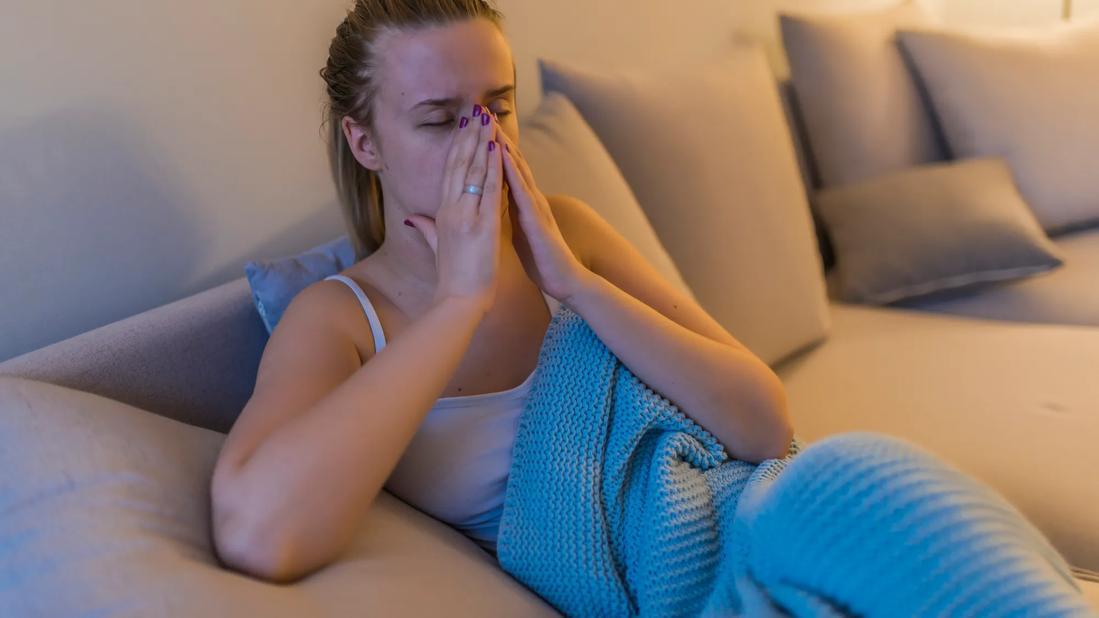Why Your Allergies May Be Worse at Night — and What To Do About It
If allergies have you coughing and sniffling all night, try showering before bed, keeping the windows closed and propping your head up

If you live with allergies, you know the symptoms can wax and wane with the seasons. But what’s more, your symptoms can vary throughout the day, too.
Some people say their allergies hit hardest in the morning. For others, allergies get worse at night. Those nighttime allergy attacks can be frustrating. And they can wreak havoc on your sleep.
We talked with allergist Sandra Hong, MD, about why allergies can be worse at night and strategies to find relief.
Why your allergies can feel worse at night
Allergy symptoms are a sign that your body is trying to protect you from what it (mistakenly) thinks are harmful substances. So, when you’re pummeled by allergens like pollen, dust, pet dander and ragweed late in the day, it’s natural that allergy symptoms will come on strongest at night.
That means getting ready for bed with allergy yuck, like:
- Headaches
- Watery or itchy eyes
- Coughing
- Sneezing
- Runny nose
- Congestion
Here are some specific reasons why it may be happening.
Pollen exposure
If you’re susceptible to outdoor allergens, like pollen or ragweed, you may feel worse at night because you’re coming into contact with those allergens later in the day.
“During the day, we’re typically inside — we’re working or going to school — so allergies don’t tend to be as much of a problem then,” Dr. Hong points out.
But when you leave your temperature-controlled office and head out to, say, take a run in the park or mow the lawn, you come face-to-face with allergens. Literally. And your immune system flares up, causing allergies to feel their worst.
Indoor allergens
Even if you go straight from your office to your home, the allergens that live in your house are there to greet you. Like dust mites, pet dander and more. That can cue an evening allergy onslaught.
What’s more, if your windows are open and letting in that beautiful (but pollen-filled) spring air, you’re coming home to a house full of allergens that have blown in.
Gravity
You may not feel your allergy symptoms too strongly during the day, but when you lie down at night, they can rear their ugly heads.
That can happen because allergies can cause a buildup of mucus in your sinuses. When you lie down for the night, that mucus can slide to the back of your throat. That's called post-nasal drip. And it can cause sore throat, coughing, congestion and more.
Finding relief when allergies strike at night
Over-the-counter allergy medications can help take the edge off allergies, whether they hit morning, noon or night. And taking a few precautions to keep allergies out of your home can help, too.
Dr. Hong suggests these methods to help relieve nighttime allergy symptoms.
Close your windows
Yes, that spring breeze can feel lovely, but the air that comes in through your open windows (both at home and in the car) brings with it a ton of allergens that can leave you searching for allergy relief.
Shower at night
Washing away the allergens before getting into bed can help keep your allergy-defense system from plaguing you as you try to sleep.
If it’s not a hair-washing night, consider covering your hair in bed with a bonnet.
“Allergens can get in your hair and on your pillow. When you flip over, they get on your face and in your eyes,” Dr. Hong explains.
Be sure to wash your face before bed, too.
“Washing your face at night gets the pollen off of our face, out of our eyelashes and off of our eyebrows, so they’re not getting into our eyes, and we’re not rubbing it directly into our eyes, causing us more symptoms,” she adds.
Do an evening sinus rinse
Saline sprays and neti pots before bedtime can help clear out the gunk that’s trying to take up residence in your sinuses. That removes allergens from your nasal cavity and prevents postnasal drip.
Elevate your head
Lying flat allows mucus to settle in your throat and chest. Grab an extra pillow (or raise the head of your bed if you have an adjustable mattress) to let gravity work in your favor.
Keep pets out of your bedroom
Sorry, but between the hair, dander and the pollen they bring in from outside, your furry friend can make your allergies worse. Don’t let your pet sleep in bed with you. And, ideally, keep them out of the bedroom altogether.
Wash your sheets regularly
Clean and hypoallergenic bedding can keep away the allergens that prompt your evening coughing and sneezing. To keep dust mites at bay, use zippered covers for your pillow, mattress and box springs.
Wash your sheets and pillowcases regularly — every week would be a great routine.
And don’t dry your clothes or sheets outside if you can help it. That’s just inviting more pollen and other irritants.
Keep the air moist
Dry air allows allergens to spread more easily. A humidifier or air purifier can help to keep your evening allergies more manageable.
Still not getting the allergy relief you need to sleep soundly? Talk with a healthcare provider, like a primary care physician or allergist about your allergy symptoms and their effect on your nights. They can help you understand your allergy triggers and develop strategies to manage them.